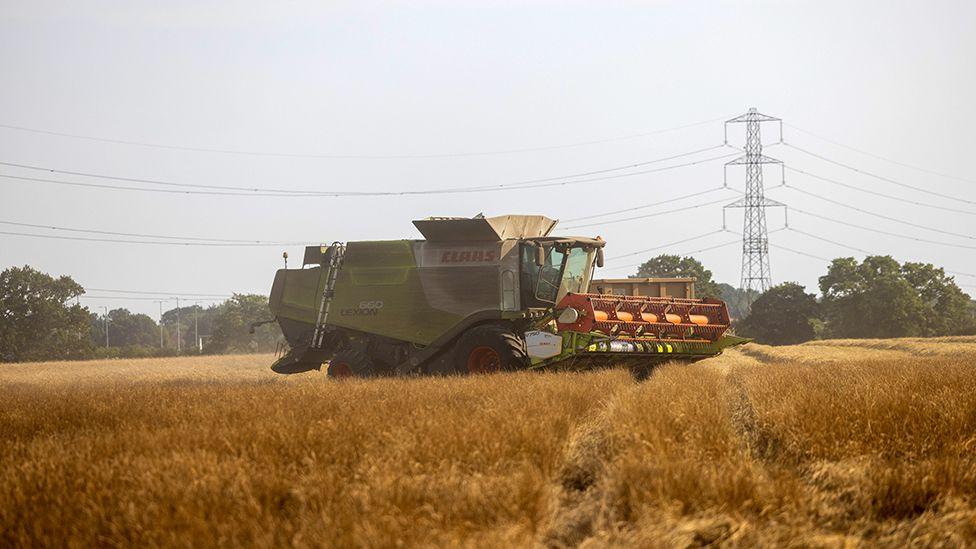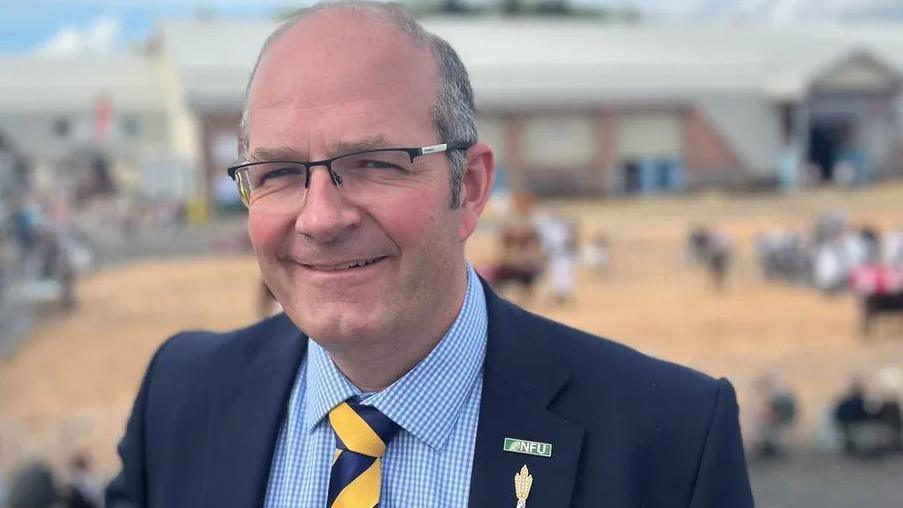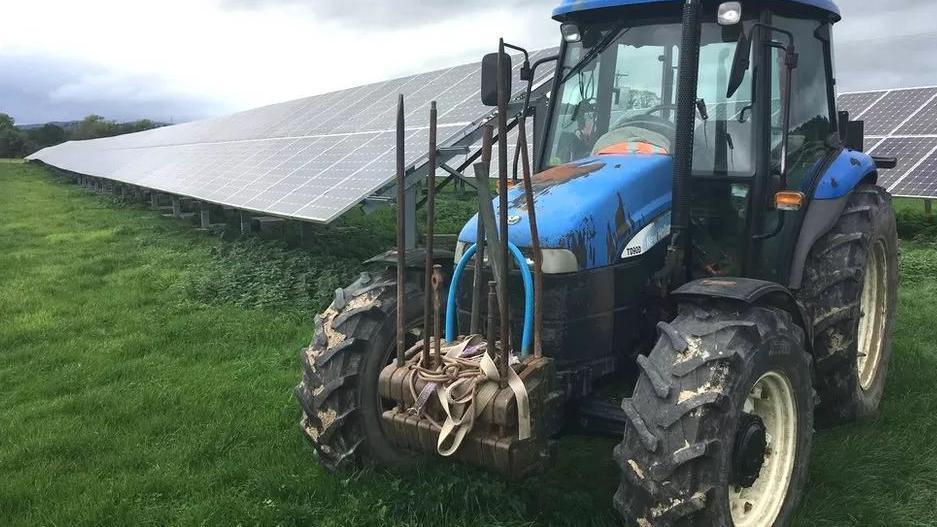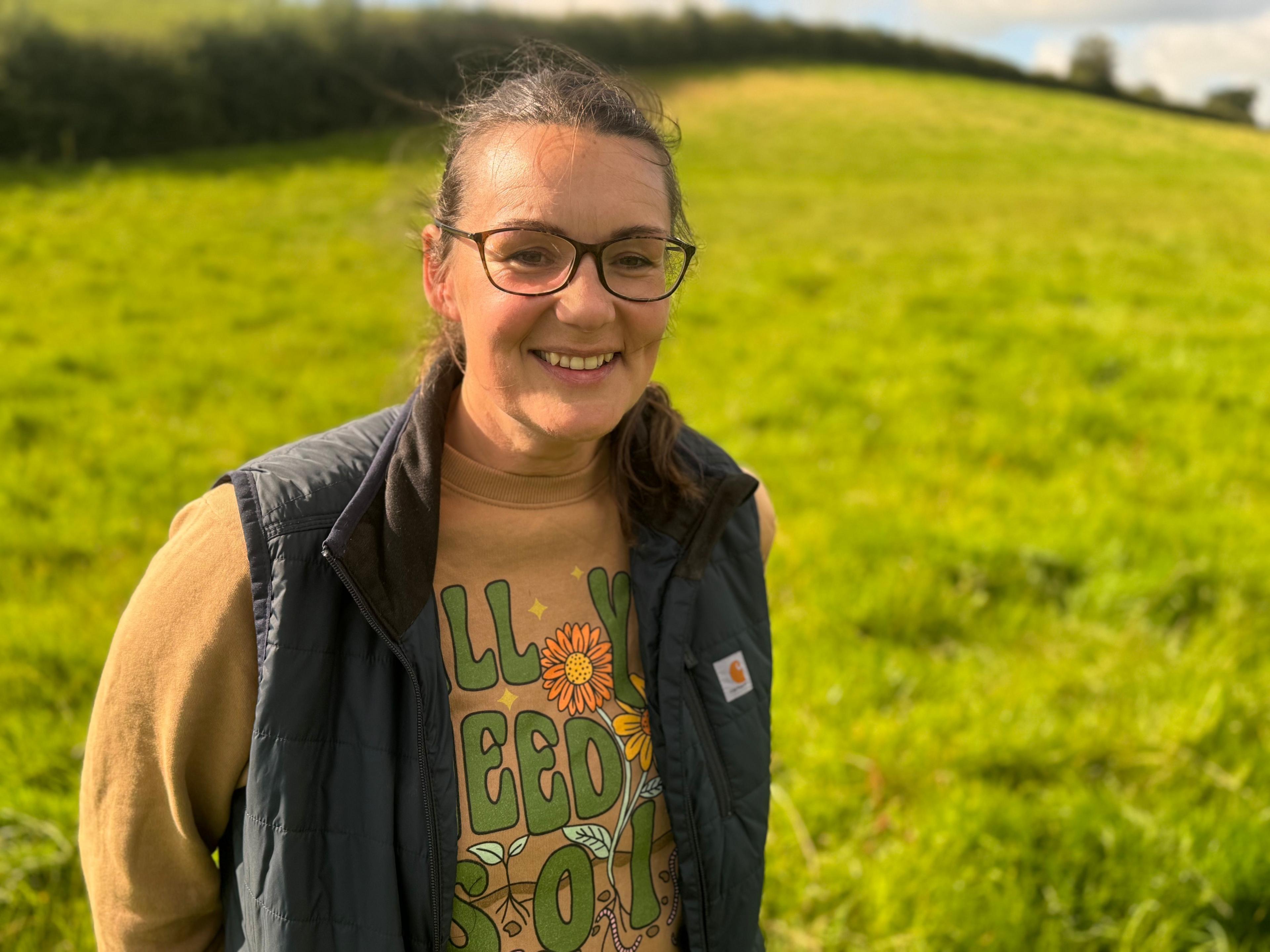UK farming's 'net zero' climate target in doubt

The NFU had set a "national aspiration" for farming to produce net zero greenhouse gas emissions by 2040
- Published
Ambitious plans to make farming ‘net zero’ by 2040 - 10 years ahead of the UK’s legally-binding national target – may not be achieved, the National Farmers' Union (NFU) has told the BBC.
Reaching net zero means no longer adding to the total amount of greenhouse gases already in the atmosphere. The NFU said a lack of investment in climate-friendly farming measures by the previous government had made doing that by 2040 “tricky” but insisted that the deadline would not be dropped.
Meanwhile, the Soil Association warned that UK agriculture would not be able to reach net zero greenhouse gas emissions “without radical changes".
The government said it was “committed to reducing emissions in the farming sector”.

NFU president Tom Bradshaw believes farming remains a key part of efforts to decarbonise the UK economy
The UK has a legally-binding target, external under the Climate Change Act to be net zero by 2050.
In 2019, the NFU set its own target for agriculture in England and Wales to reach net zero greenhouse gas emissions by 2040. In Scotland, the net zero target is 2045.
Farming is currently responsible for around 12% of the UK’s total greenhouse gas emissions, external, predominantly nitrous oxide from fertilisers and manure and methane from ruminant livestock, as well as carbon dioxide - to a much lesser extent - from energy and fuel.
The drive to net zero in farming has focused on helping farmers to develop more efficient and sustainable production methods, changing how land is managed in order to capture more carbon in the soil and boosting on-farm renewable energy schemes.
When it was launched, the 2040 target , externalwas described as “a national aspiration, not an expectation that every farm can reach net zero”.
But, while work to reduce emissions is largely left to individual farms, the industry has pilot projects under way to monitor and record that work and help form a national picture of progress made towards net zero.

The NFU has called for the UK’s total agriculture budget to be increased from £3.5bn to £5.6bn
The government says it is helping farmers reduce greenhouse gases through the post-Brexit farm payments system, known as environmental land management schemes (ELMs).
But the NFU said that its target would now be “tough to hit” because the previous government had not put enough investment into “climate-friendly measures” under ELMs.
Tom Bradshaw, NFU president, told the BBC he still believed farming was “very much part of the solution to decarbonising the UK economy” but that more investment was needed.
“Net zero is never going to be an ambition farmers can deliver alone,” he said.
To mark Back British Farming Day on Wednesday, Mr Bradshaw called for the UK’s total agriculture budget to be increased from £3.5bn to £5.6bn.
He said that was what was needed for farmers to produce more food while “delivering for nature, energy security and climate-friendly farming”.
'Real urgency'
The call for greater funding comes amid fears the government is looking to cut £100m from its farming budget.
Both Defra and the Treasury declined to comment on any proposed cuts but the government has acknowledged there was a £358m underspend in the agricultural budget over the past three years.
Richard Benwell, CEO of environmental coalition Wildlife and Countryside Link, said any cut in the nature-friendly farming budget would “seriously endanger the transition to net zero in farming”.
Brendan Costelloe, the Soil Association’s policy director, said cuts would be a mistake “that would cost the environment, wildlife and the taxpayer more over the long-term”.
“British farming will not be able to reach net zero by 2040 without radical changes to how we produce and eat food”, he added.
The government's independent advisers, the Climate Change Committee (CCC), external, have already warned that progress in reducing emissions in agriculture has been slow and needs “substantial acceleration”.
The latest government figures, external show total agricultural greenhouse gas emissions have decreased, with nitrous oxide emissions down by 23% and methane down by 15% between 1990 and 2022.
Meanwhile, carbon dioxide from farming accounted for only 2% of total UK emissions in 2022.
Tom Lancaster, land analyst at the Energy and Climate Intelligence Unit (ECIU), said there was a “real urgency” for government to help the sector cut emissions further and to support farmers in becoming more resilient to climate extremes.
A spokeswoman for Defra said the government was still “committed to reducing emissions in the farming sector and restoring confidence amongst farmers which is at a record low".
"That is why we will restore stability and confidence by optimising our schemes and grants, to ensure we protect our food security, assist nature’s recovery and drive down emissions.
“But we will go further to support our farmers by protecting them from being undercut in trade deals, making the supply chain work more fairly and preventing shock rises in bills by switching on GB Energy,” she added.
Related topics
- Published6 September 2024

- Published30 November 2023

- Published1 June 2023
